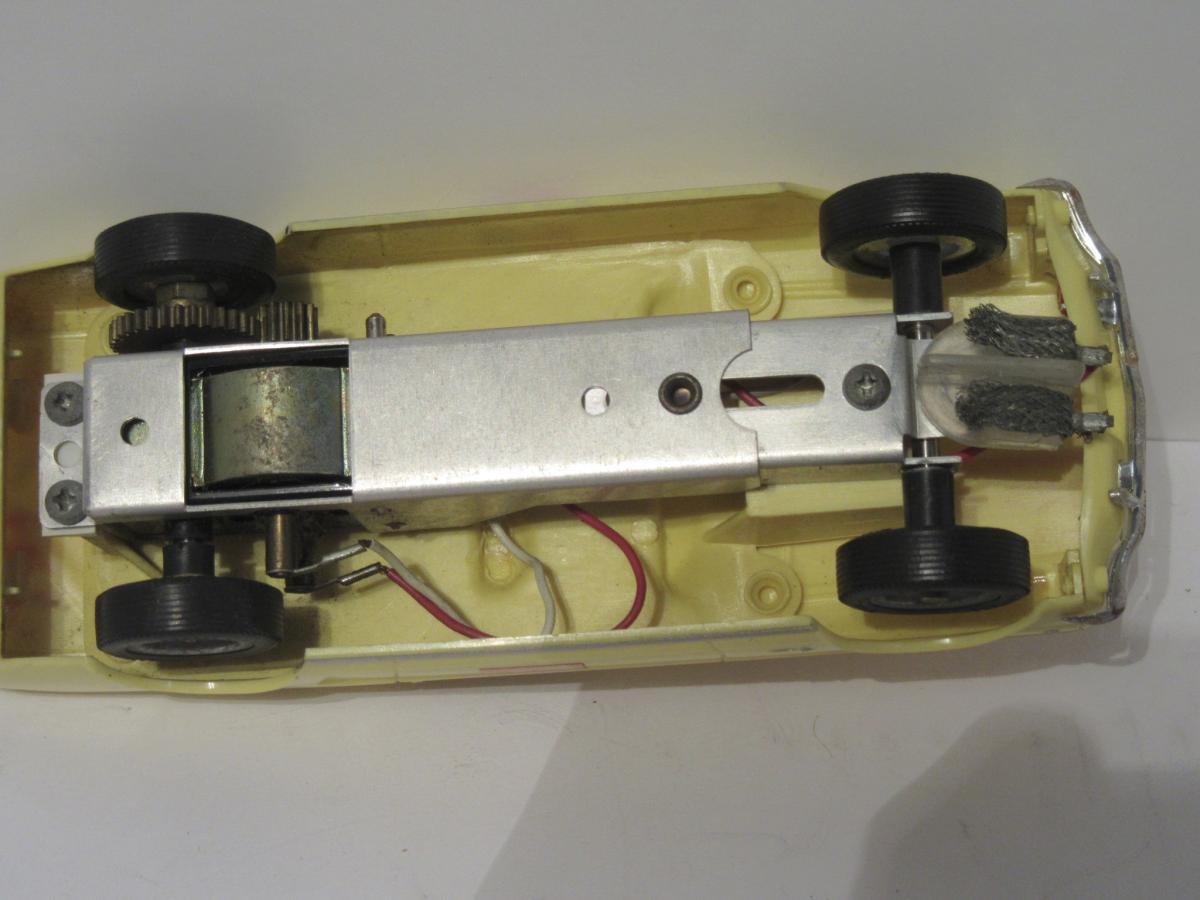The late Roy Moody is correctly credited by slot car historians for inventing the so-called "anglewinder" chassis design. He did so in the middle of 1967, and his creations were first made public when he sent a pair of cars from his Illinois home to a 1/32 scale proxy race run in New Jersey in November 1967. While his cars were lacking power due to their near-stock Mabuchi FT26 motors, noted pro racer Sandy Gross wrote in Model Car Racing that they were very impressive in the twisty bits. These cars eventually led the late Gene Husting to build a 1/24 scale car that effectively revolutionized slot car chassis design, to this day. Below is one of the very first cars Roy built that in that summer of 1967:
But a few years before that first anglewinder car, Moody designed and built another interesting car that could also have caused a revolution, but... did not. This car used a highly modified Pittman motor and a chassis that allowed the very magnetic bits to be flush with the bottom of the brass chassis. This car survived in the Roy Moody estate and is now on display at the LASCM museum in California. It is incomplete in that Moody pirated his own cars and the whole rear axle is missing.


You can see in this picture, the motor's magnet and its position under the car.
So why did not this car cause the same revolution as the anglewinder?
Well, simply because all the club tracks in Illinois had... copper tape conducting rails, that are of course, non magnetic...
Hence, what could have been, never did. ![]()

The world's first "magnet traction" slot car that never was...
#1

Posted 26 January 2020 - 03:58 PM
- slotbaker, Tex, tonyp and 3 others like this
Philippe de Lespinay
#2

Posted 27 January 2020 - 10:17 AM
Interesting.
It was pointed out to me (maybe here, maybe on a different forum) that the Aurora/K&B chassis shows a similar design, in that one of the motors' magnets is exposed to the track surface...
...is the example you show from about that same time frame?
Mark in Oregon
#3

Posted 27 January 2020 - 10:55 AM
Hello Mark,
The car built by Moody was actually built a couple years earlier, but it does not matter since Moody was unlikely to have ever been aware of the potential.
Following a certain reasoning and sometimes, claims, just about any sidewinder slot car could be considered as a potential "magnet traction car", but most are not. In the case of the K&B/Aurora chassis, the actual ground clearance, even over strong steel rails such as seen on a Scalextric track (on which such cars are unlikely to have ever been used) is enough that the potential for down force is minuscule.
The Atlas cars with the Marusan inline motors make good candidates for that, but no one can make a claim that they figured it out (by angling the front chassis mount) until... the early 2000s.
And even then, with stronger "cheater" magnets made by.... cheaters. ![]()
- strummer likes this
Philippe de Lespinay
#4

Posted 27 January 2020 - 11:04 AM
Philippe, that looks like it was done to lower CG rather than magnetic traction reasons.
Edit: Oops! You made a post while I was posting. Never mind.
- TSR and strummer like this
???-2/31/23
Requiescat in Pace
#5

Posted 27 January 2020 - 11:13 AM
Phil,
exactly my point. And what a missed opportunity! Would Roy Moody had been running this car on a period Revell or Monogram track, the spark that would have exploded in Rockford, Illinois, would have been visible all the way to California! ![]()
- tonyp, Phil Smith and strummer like this
Philippe de Lespinay
#6

Posted 27 January 2020 - 12:38 PM
Hello Mark,
The car built by Moody was actually built a couple years earlier, but it does not matter since Moody was unlikely to have ever been aware of the potential.
Following a certain reasoning and sometimes, claims, just about any sidewinder slot car could be considered as a potential "magnet traction car", but most are not. In the case of the K&B/Aurora chassis, the actual ground clearance, even over strong steel rails such as seen on a Scalextric track (on which such cars are unlikely to have ever been used) is enough that the potential for down force is minuscule.
The Atlas cars with the Marusan inline motors make good candidates for that, but no one can make a claim that they figured it out (by angling the front chassis mount) until... the early 2000s.
And even then, with stronger "cheater" magnets made by.... cheaters.
Phillippe
First off, I'd like to thank you for responding; it means a lot to me that someone of your stature in the slot car community would even read a post from someone such as myself! ![]() I appreciate it.
I appreciate it.
Secondly, of course you are correct; I just now checked the clearance on my Aurora Mustang, and the butt end of the chassis sits easily 1/8" or better above the surface of the track, so the magnetic pull is negligible. That's a good thing in my opinion; it seems that the very strong pull of the magnets in modern cars cause an awful lot of "drag". I have removed magnets in couple of "modern" Scalextric cars, and they now seem way more responsive...
Mark in Oregon
- TSR likes this















